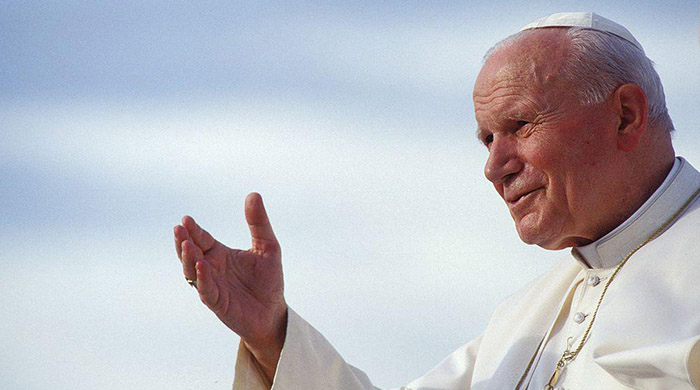“The Theology of the Body (TOB) is pretty hard to understand for a lay person. How can I use it to have a conversation about human sexuality and chastity with my son or daughter who is already a young adult?”
It is evident that the parent-child relationship takes a turn when the son or daughter reaches college age. The parent-son/daughter dialogue can become difficult or even non-existent, especially given the hypersexualized culture of today. Another factor is that today’s society is permeated by a spirit of rebelliousness and arrogance, especially in academic settings. Having been a college instructor myself, I can tell you that university students are very gullible when it comes to so-called “progressive” or “liberal” professors. Whatever these teachers say in class becomes like a “Bible” to the students.
Also, we are currently living in the midst of a “cancel culture” in which peaceful discussion of ideas has been thrown out the window and replaced by hostile intolerance. The combination of these attitudes and the gender ideology many young people have learned since high school can become a daunting barrier to real conversation.
It is also true that the theology of the body is not easy to understand for Catholics who have not been trained in theology, philosophy, and biblical science. Catholics do not have the obligation to specialize in these subjects, unless they want to become religion teachers or theologians. But Catholics, and especially parents, do have the serious obligation to know and defend their basic Catholic Faith that is expounded in the Catechism of the Catholic Church and other magisterial documents.
When parents and other committed Catholics have trouble understanding and putting into practice these beautiful teachings, they should seek help from priests or other faithful and knowledgable Catholics. The Church is there to help them, and so is Human Life International.
In the case of the TOB, thanks to God there is a solution. The Vatican document The Truth and Meaning of Human Sexuality (TTMHS) is based on the TOB. It was published by the then Pontifical Council for the Family on December 8, 1995 – and it is still quite relevant. This beautiful and solid document is much easier to understand precisely because it is primarily addressed to parents. It also has a section dedicated to how parents can approach the topics of human sexuality and chastity when their children have become young adults. The section is short but full of meaningful advice and guidance. It is found in numbers 109-111 of the document.

Another document that is based on the TOB when discussing human sexuality, marriage and chastity is the Catechism of the Catholic Church, whose pertinent sections we will list below.
Which Church documents should we study to prepare for dialogue with our children about human sexuality?
Below is a partial list of Church documents that discuss sexuality, marriage, and chastity:
- The Catechism of the Catholic Church (CCC)
- The encyclical Humanae Vitae
- The Truth and Meaning of Human Sexuality
- Familiaris Consortio
The Catechism of the Catholic Church has specific sections that relate to the marriage vocation:
- The creation of man and woman, nos. 369-384
- The family, 2201-2233
- Chastity, 2331-2400
- Purity of heart, 2514-2533
- The Sacrament of Marriage, 1601-1666.
An added benefit of these and other Church documents is that they quote quite frequently from the Word of God in the Bible. For this reason, the Catholic student does not have to spend precious time looking for those important and pertinent Scriptural passages by himself.
When my wife Ilse and I were preparing for marriage, we took the time to read and study together most of these documents. It was a beautiful and wholesome time of getting to better know the richness of our Catholic Faith, especially as it related to marriage.
Unfortunately, many Catholics do not know their faith well, including young adults. This is why they are timid about their Catholicism and tricked by all kinds of ideologies, from pro-aborts to promoters of the LGBT agenda. Parents must train themselves in the Word of God and in sound doctrine, so that they can share the truth with their children and train them to be pure and holy and to respectfully, but firmly, refute all kinds of dangerous falsehoods.
St. Paul told young Timothy to continue to train himself in the Word of God as he had been
…from childhood acquainted with the Sacred Writings which are able to instruct you for salvation through faith in Christ Jesus. All Scripture is inspired by God and profitable for teaching, for reproof, for correction, and for training in righteousness, that the man of God may be complete, equipped for every good work.… For the time is coming when people will not endure sound teaching but having itching ears they will accumulate for themselves teachers to suit their own likings and will turn away from listening to the truth and wander into myths. (2 Tim. 3:15-17, 4:3-4)
This is why parents must also live a life filled with prayer and frequent recourse to the Sacraments of Confession and the Holy Eucharist. Intellectual knowledge of the Truth is not enough. The active presence of the Holy Spirit enlightening their minds and strengthening their hearts is also necessary. And if they can share prayer with their sons and daughters, especially the Holy Rosary and the Mass, all the better.

Parents should study these documents together. They might also try to meet with other parents to form a group of parents. In these groups, parents can pray and study together the teachings of the Church regarding these issues. They should also help and support each other in this difficult task of transmitting to their young adults the beautiful values inherent in human sexuality and chastity.
What is the role of parents when their children are young adults?
The Vatican document The Truth and Meaning of Human Sexuality (TTMHS) can help answer this question. It provides important guidelines to parents to help their sons and daughters navigate and dodge the dangers of today’s hypersexualized culture.
The document indicates:
- That the educational mission of the parents does not end when their sons and daughters reach adulthood. There are times in the young people’s lives when the intervention of the parents is especially important: leaving home for university or entering the workforce and facing new ideologies and lifestyles (see no.109).
- Parents must respect the legitimate autonomy of the young adults. However, parents ought to be a constant point of reference for them through their example and advice.
- Parents ought to advise their young adults to maintain a vibrant spiritual life: regular prayer, Bible study, frequent reception of the sacraments, choosing a good spiritual director, and so on.
- Parents ought also to encourage their young adults to work for the transformation of the world where life, marriage and the family are respected and cherished, without fear of professing themselves as Christians in the public square.
- Parents may also share with their young adult students the beautiful teachings about human sexuality, chastity, and marriage contained in the documents listed above.
What is the role of parents in their sons and daughters’ vocations?
The general context of the whole document The Truth and Meaning of Human Sexuality is God’s vocation, or calling to love authentically, for all Christians. The immediate context is God’s call to a specific vocation: marriage or virginity/celibacy for the Kingdom of Heaven. Within this immediate context, the parents:
- Ought not to limit themselves to simple prohibitions, and even less should they decide for their children what their vocations are or who will be their future spouses.
- Parents ought to share with their children the correct criteria or set of values with which to make correct decisions. They should be able to answer the why questions of their sons and daughters with humility, respect and loving firmness (see 1 Peter 3:15).
- Parents ought to confirm by their own example the validity of these correct criteria for choosing a vocation or a spouse.
- Parents ought to avoid the dangerous mentality claiming that young men may engage in premarital sexual relations to prove their virility, but that young women should remain virgins until marriage. Unfortunately, this mentality exists in most cultures, and even among some Catholics. Both men and women should practice chastity before marriage.
What is courtship?
Courtship is a time to prepare for marriage. It is a time for the young man and the young woman to get to know each other better through frequent, honest and respectful dialogue. It is important that both get to know the moral and spiritual values of the other person. For a Christian marriage to succeed, it is necessary that the man and the woman share the same essential values.

Courtship is also a time for the couple to come to comprehend more deeply the teachings of the Church on marriage and the family. They should come to understand the connection between God’s commandments and the values they protect and nurture. In this way they will come to love, admire, and respect God’s law. They will come to understand that obedience to God’s Commandments brings happiness to the heart (see Psalm 19:8-9). They should read and discuss these teachings, which can be found in the documents we cited above.
Catholic courtship faces many dangers today. The gravest and most insidious danger Christian couples preparing for marriage face today is the erroneous claim that sexual relations with the intention of getting married later are OK. In no uncertain terms, the Catechism of the Catholic Church denounces this so-called “trial marriage”:
Some today claim a “right to a trial marriage” where there is an intention of getting married later. However firm the purpose of those who engage in premature sexual relations may be, the fact is that such liaisons can scarcely ensure mutual sincerity and fidelity in a relationship between a man and a woman, nor, especially, can they protect it from inconstancy of desires or whim. Carnal union is morally legitimate only when a definitive community of life between a man and woman has been established. Human love does not tolerate “trial marriages.” It demands a total and definitive gift of persons to one another. (CCC 2391)
Among the many causes of this mentality of “trial marriage” are the following:
- The reduction of love to sexual relations and the reduction of sexual relations to genitality
- The indefinite prolongation of courtship
- The bombardment of pornography, sensuality and lack of modesty in the media
- The easy availability of contraception and abortion
- The perverse ideologies of gender and transgenderism
Regarding the latter, parents have the obligation of informing themselves about the fallacies and dangers of these ideologies. Human Life International has an excellent section of free articles about LGBTQ issues here. We also invite parents and young adults themselves to explore these resources on different pro-life and pro-family issues. Each of these topics is well-organized and the articles are based on the teachings of the Bible and the Church.
In sum, Christian couples preparing for marriage should practice chastity in all their relations. During courtship, couples should remember:
- It is gravely immoral to engage is certain types of kisses or petting with the intention of obtaining sexual arousal even without the intention of having sexual relations.
- The gestures of affection between a man and a woman who are preparing for marriage must be such that their purity of heart is maintained and their sexual drives are under control.
- They should also avoid near occasions of sin, such as immoral movies and social situations that could be inducive to commit sexual sin.
- They should also practice together a solid spiritual life by means of prayer, frequent recourse to the sacraments, Bible study, and so on.
How can we explain why premarital sexual relations are gravely wrong in themselves?
Based on the TOB, the simple answer to that question is that premarital sexual relationships betray the conjugal meaning of the body and its corresponding language of the body. Of course, this simple and straightforward answer needs to be unpacked. This TOB language is so full of beautiful truths that once they are understood and accepted in the heart, the question about premarital sexual relations simply evaporates into thin air.
Let us recall that the conjugal meaning of the body is the capacity that God has inscribed in the bodies of men and women to express authentic love in marriage as a reflection of the conjugal love that Christ has for His Spouse, the Church, and that the Church ought to have for Christ (see Ephesians 5:21-33).
The conjugal meaning of the body is comprised of all those beautiful values that constitute the different dimensions of conjugal love and that would-be spouses ought to have in their hearts:
- The oneness and indissolubility of marriage
- The ends of marriage: procreation and mutual help and support
- Conjugal love intrinsically open to life and lifelong, which is essential to marriage
- The values inherent in the “ethos of the Gospel” (keep reading)
These values are the same ones we listed above, but they also include those proclaimed by Jesus in His Sermon on the Mount (Matthew 5-7), especially in the beatitudes. We mention just a few of them: humility, meekness, purity of heart and body, honesty, courage in face of persecution, compassion, peacemaking, desire for justice for all, and so on.
We can also include the gifts of the Holy Spirit: wisdom, understanding, counsel, fortitude, knowledge, piety, and fear of the Lord (Isaiah 11:1-2, CCC 1845).
Then there are the theological and cardinal virtues: faith, hope, and love, and prudence, justice, fortitude and temperance (chastity is part of temperance). See CCC 1833-1844.
Finally, we could also mention the fruits of the Spirit in Galatians 5:22-23: charity (sacrificial love), joy, peace, patience, kindness, goodness, generosity, gentleness, faithfulness, modesty, self-control, and chastity (CCC 1932).
By means of self-discipline together with a strong spiritual life, the human person is capable of cherishing these values, virtues, and gifts. He is able to accept them in his own heart. The set of all of these beautiful values as appreciated and contained in the human heart is called the ethos of the Gospel by St. John Paul II in his TOB. The reason for this term is because these are the values that Jesus Himself has in His own Sacred Heart. Jesus’ mission was to inculcate these values into our hearts and to have us reject the corresponding anti-values that might still be there.
Figure of Christ by Heinrich Hofmann (PD-US-expired)
This is a process of conversion. Since this process is lived through the body, it is also the process of the redemption of the body, which will reach its fullness and perfection in the world to come (see Romans 8:22-23). The Catholic couple preparing for marriage should be trained in these values, because these are the values they will live and that will make them happy as a married couple.
Now to the question of why sexual relations before (or outside) marriage are wrong in themselves.
The sign of the Sacrament of Marriage consists in the vows the groom and the bride express in words during their wedding ceremony, and also in the conjugal act they will later engage in. The sacramental grace inherent in the sign of marriage is essentially to make present the conjugal love between Christ and His Church. But that double sign is also comprised of all the beautiful values we just mentioned.
The conjugal act that consummates the marriage and all future conjugal acts should physically express all of these values. When the spouses are sincere in their love for each other as they engage in the conjugal act, it is said that their “language of the body” expresses the truth about Christian marriage and about the Christ-Church marriage. But if the Catholic couple (or any couple for that matter) does not express all of these values in their sexual relationships, then it is said that their language of the body is a false language, a counterfeit of the true language of the body.
In sum, the conjugal meaning of the body ought to be expressed by a truthful language of the body. Otherwise, it is a betrayal of the meaning God has inscribed in the bodies of man and woman.
This is why premarital relations and cohabitation are wrong in themselves. They do not express authentic conjugal love open to life and life-long. They do not express, at least not with a permanent and stable disposition, all of the values inherent in the conjugal meaning of the body and in the sacramental sign of marriage.
Furthermore, marriage is also a public act (the wedding) and a public state. We Catholics live in two societies: the Catholic Church and civil society. We have a responsibility to both societies, especially regarding the children God will grant us as His most precious gift to marriage. The children, the Church, and society deserve and need our commitment as responsible parents and social members. Sexual relations and cohabitation do not express the values and commitments inherent in this public aspect of marriage. Therefore, they are also wrong on that account.
In fact, premarital relations and cohabitation are intrinsically and gravely evil. And those who engage in such relations with full knowledge that it is such and with complete freedom commit a mortal sin that bars them from Communion and from Heaven, unless they sincerely repent and confess their sin.
The reason such relationships are intrinsically evil is because the values they betray are inherent to the human person as created by God. The reason they are gravely evil is because the values they betray are very important: conjugal love, openness to life, and so on.
Practical Reasons to Wait until Marriage to Engage in Sex
Even though we already discussed the doctrinal aspect of the dangers of premarital sexual relations and cohabitation, it is also important to have at hand a simple and point-by-point guide to help young adults stay chaste. Here are some practical reasons to save sex for marriage:
- You do not have to worry about unplanned pregnancies.
- You do not have to worry about being ashamed before your parents.
- You do not have to worry about AIDS or any STD.
- Remember that there are no condoms for broken hearts.
- You will learn self-control and forge a strong and loving character.
- You will learn how to associate with good friends who share your values.
You will protect your reputation so that one day you can find a good spouse. - You will channel your energies in positive ways (sports, arts, academics, Christian service).
- You will discover the opposite sex in a respectful and healthy manner.
- Your mind and heart will be purified and thus enabled to find true love.
What are some practical ways to say “NO” to premarital sexual relations?
- Sexual relations are very important but I am not ready to have them.
- I don’t want to have sexual relations now. I prefer to wait till marriage.
- Don’t watch movies, TV programs, internet sites that might induce you to sexual sin.
- Avoid bad friends and instead find virtuous friends who support your Catholic values.
- Don’t be deceived. Your life and health are very valuable.
- You are not yet ready to have a baby.
- You could get your girlfriend pregnant and be morally responsible if she aborts your child.
- If you really love me, respect my decision to wait till marriage.
Besides some practical ways to say “NO” to premarital sex, it is also very helpful to reflect on the following questions:
- Is it in accordance with my values and self-esteem to have sex before marriage?
- Could I give the care and economic sustenance to a child I might beget?
- If I break up with my girlfriend, would I feel OK about having had sex with her?
- Is this true love? Wouldn’t he be using me just to have pleasure?
- Am I using her as an object for my selfish pleasure?
- Shouldn’t I fear God’s just and eternal punishment due to my sexual sins?
- Am I honoring Jesus, Mary and Joseph with my sexual behavior?
- Shouldn’t I love and honor Jesus, Mary and Joseph with a life of purity and chastity?
We would like to end this article by telling parents to not be afraid, but to start working right away in the double task of intensifying their spiritual lives and of diligently studying the Word of God and the teachings of the Church so as to be prepared to dialogue with their adult sons and daughters about chastity, marriage, family, and human sexuality. The Catholic Church and Human Life International are here to help.
This article has been reprinted with permission and can be found at hli.org/resources/using-the-theology-of-the-body-to-teach-chastity-to-young-adult-children.
